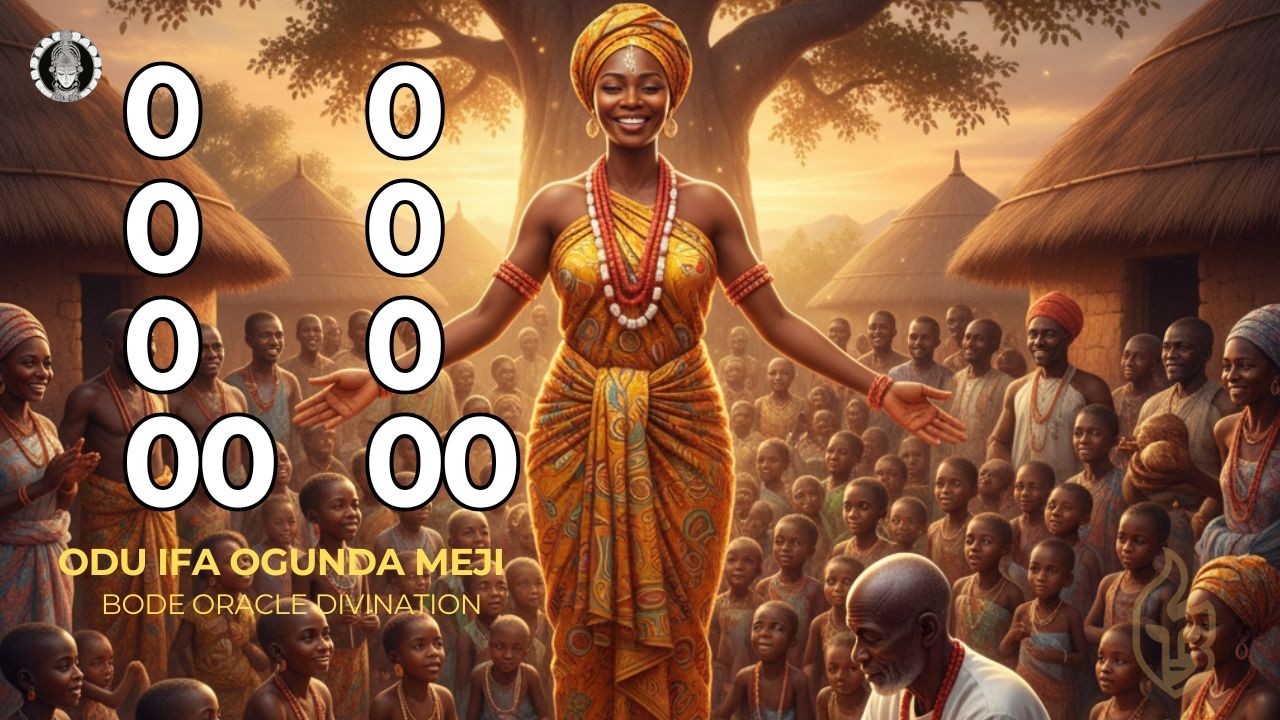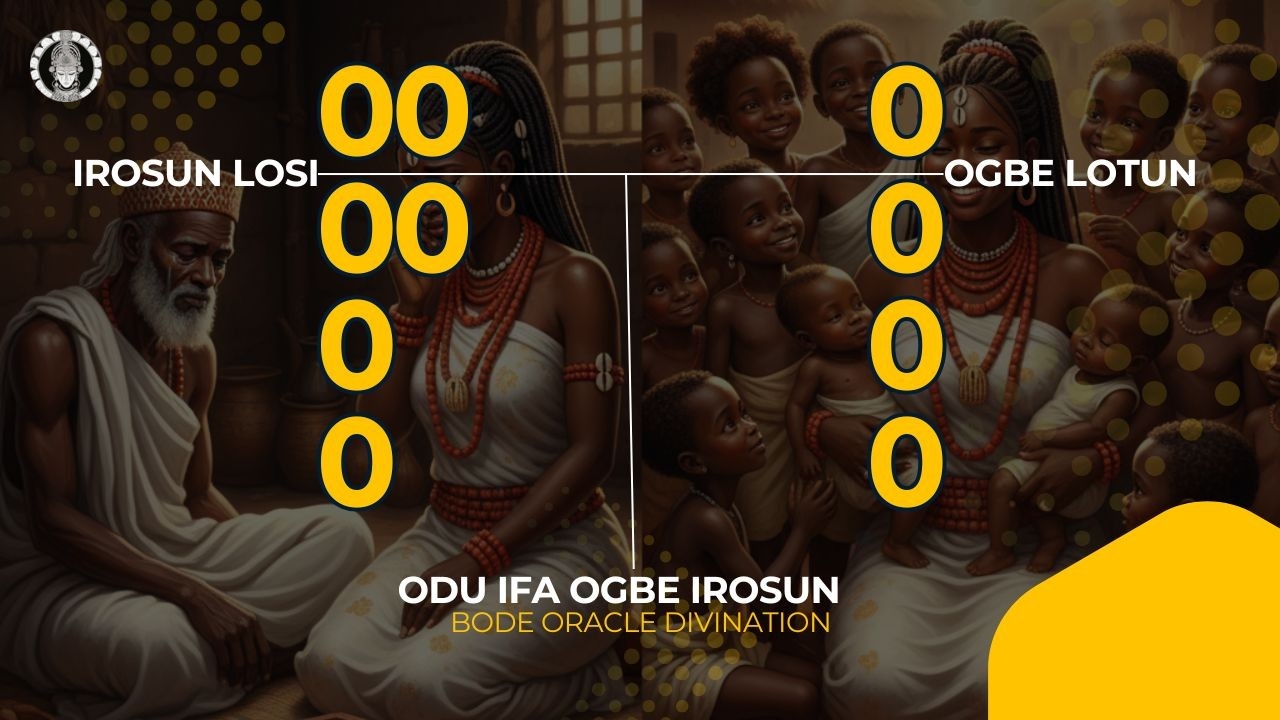Introduction to Odu Ifa Ogbe Irosun (Ogbe Mosun)
Odu Ifa Ogbe Irosun, also known as Ogbe Mosun or Ogbe Rorun, represents one of the 256 sacred divination signs in the Ifa corpus. This powerful Odu carries profound messages about overcoming infertility and blessing families with many children, achieving victory over enemies who use harmful medicine or spiritual attacks, receiving proper recognition for good deeds after experiencing ingratitude, and maintaining spiritual protection against evil forces through vigilance and sacrifice.
The divinations within Ogbe Irosun address fundamental human challenges: the deep longing for children, the struggle against powerful adversaries, the pain of unrecognized good works, and the need for spiritual defense. Each story demonstrates how proper sacrifice transforms seemingly impossible situations into testimonies of blessing and victory. For comprehensive understanding of the 16 Odu Ifa and their meanings, explore our detailed guide.
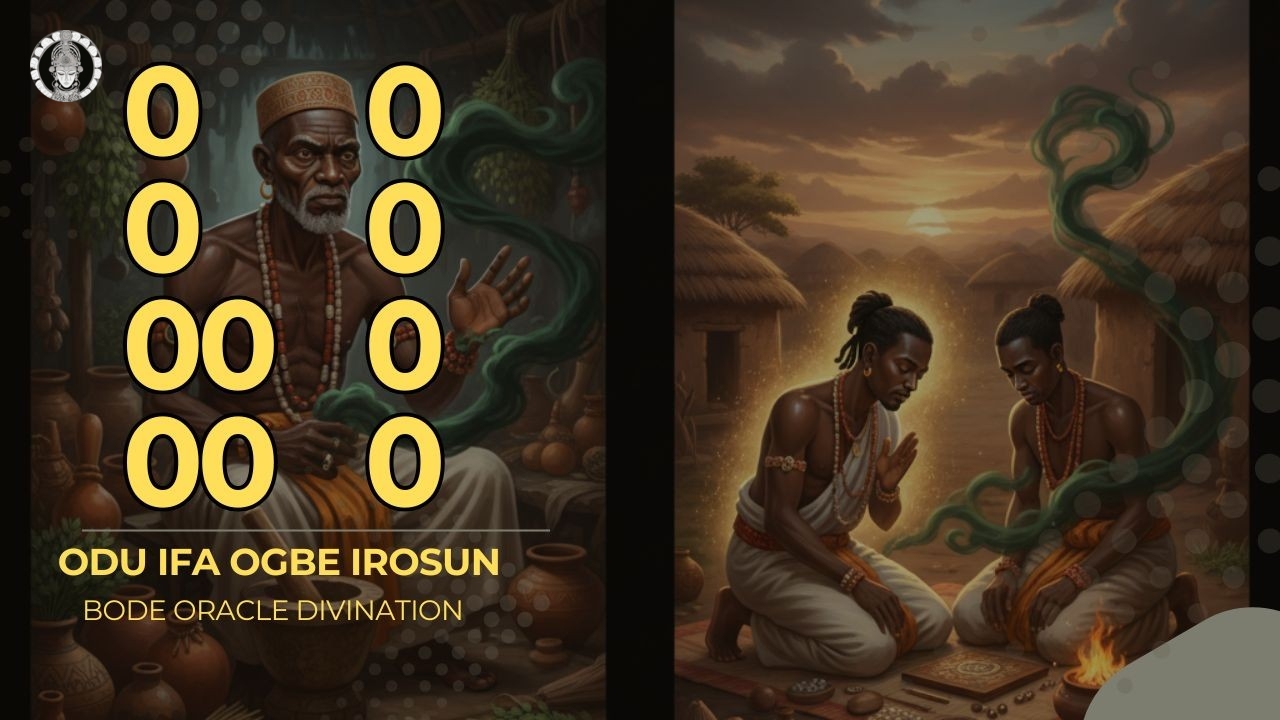
Ifa Divination for Osungaga: The Blessing of Abundant Children
Understanding the Longing for Children
This divination from Ogbe Irosun addresses one of the most profound human desires—the longing to become a parent. Ifa reveals that the person receiving this Odu has been struggling with infertility, experiencing the emotional weight of unsuccessful attempts to conceive. This situation represents not just physical challenges but also the spiritual and emotional dimensions of bringing new life into the world.
The story of Osungaga teaches that infertility is not a permanent condition when addressed through proper spiritual intervention. What appears as biological impossibility can transform into abundant blessing through faith and compliance with Ifa's prescription. The emphasis on "many children" (ọmọ lópọlọpọ) demonstrates that Ifa's blessings often exceed our expectations—not just one child, but many.
The Sacred Verse
Mo rú wéré
Mo tú wéré
A d'Ífá fún Òsùngàgàgà
Ti ńsunkun pe óun ó bí'mọ
English Translation
I made a small offering
I performed a small ritual
This was the Ifa cast for Osungaga
Who was crying, saying she wanted to have children.
The Power of Small but Sincere Offerings
The phrase "mo rú wéré, mo tú wéré" (I made a small offering, I performed a small ritual) contains profound wisdom about the nature of effective sacrifice. The emphasis is not on the size or cost of the offering, but on the sincerity and compliance with spiritual instruction. Osungaga's sacrifice was described as "small" (wéré), yet it produced extraordinary results—transforming barrenness into abundant fertility.
This teaches that Ifa does not require elaborate or expensive sacrifices to work miracles. What matters is the heart's sincerity, the faith in following guidance, and the willingness to act on spiritual instruction. A small offering made with complete faith surpasses a large offering made with doubt or reluctance.
From Tears to Songs of Joy
The transformation in Osungaga's story is complete and profound. She began with tears (ńsunkun), crying about her childlessness, but ended with songs of praise and celebration. After offering the prescribed sacrifice, she not only conceived but became "a mother of many children" (ọlómọ pupo). Her joy overflowed into music, as she sang praises to the Babalawos who guided her.
This pattern—from weeping to singing, from barrenness to abundance—represents the complete reversals that Ifa can bring into human lives. The song she sang repeated the words of her sacrifice: "Mo rú wéré, mo tú wéré," acknowledging that the small ritual she performed produced miraculous results.
Modern Application for Fertility Challenges
In contemporary times, Ogbe Irosun speaks to anyone facing fertility challenges, whether biological, circumstantial, or spiritual in nature. The Odu applies not only to physical childbearing but also to any situation where one desires to "birth" new projects, ideas, businesses, or creative works that seem unable to manifest.
The principle remains constant: when conception of any kind seems impossible despite repeated efforts, spiritual intervention through proper sacrifice can open closed wombs and bring forth abundant life. For those experiencing infertility, this Odu offers hope combined with specific spiritual action. Learn more about Ogbe Irosun divination practices on our dedicated page.
Prescribed Offerings (Ebo)
For those seeking to conceive children or bring forth new life in any form, Ogbe Irosun prescribes specific sacrifices that address both physical and spiritual dimensions of fertility. The exact offerings should be determined through consultation with a qualified Babalawo, who can assess the individual circumstances and prescribe appropriately. However, the emphasis remains on sincerity and compliance rather than elaborate expense.
Ifa Divination for Eleriwo and Eleda: Victory Through Spiritual Reversal
The Challenge of Facing Powerful Adversaries
This divination from Ogbe Irosun addresses the frightening situation of facing an enemy who possesses powerful medicine and spiritual knowledge. Ifa reveals a conflict between two individuals: Eleriwo, a highly skilled herbalist with potent medicine (oníṣégún tí ó gbóná gidigidi), and Eleda, who found himself targeted by this powerful adversary. This represents situations where we face opponents who seem to have advantages—whether through wealth, connections, knowledge, or spiritual power.
The story teaches that earthly power and medicine, no matter how potent, cannot stand against proper spiritual sacrifice. Eleda had no comparable medicine in his possession, yet through obedience to Ifa's prescription, he achieved complete victory over his seemingly invincible enemy. This demonstrates a fundamental principle: spiritual compliance surpasses earthly power.
The Sacred Verse
Àdó ńlá a bidi kotopo
A d'Ifá fún Elériwo
A bú fún Ẹlẹda
L'ọjó tí àwọn méjèéjì jọ ńṣótá
English Translation
The large gourd with a small, firm bottom
This was the Ifa cast for Eleriwo
It was also cast for Eleda
On the day the two of them became enemies.
The Symbolism of the Gourd
The opening imagery of "àdó ńlá a bidi kotopo" (the large gourd with a small, firm bottom) carries profound symbolic meaning. A gourd that is large at the top but has a small, stable base represents something that appears impressive but lacks true stability. This describes Eleriwo's position—his medicine seemed powerful and formidable, but it rested on an unstable spiritual foundation because it was used for harmful purposes.
In contrast, Eleda's position, though appearing weaker, rested on the solid foundation of proper sacrifice and spiritual compliance. The metaphor teaches that true power comes not from earthly capabilities but from spiritual alignment with divine forces through sacrifice.
The Principle of Spiritual Reversal
The most remarkable aspect of this divination is how Eleda achieved victory. Eleriwo continued to send his powerful medicine against Eleda, but the sacrifice Eleda had offered created a spiritual reversal mechanism. Every harmful force Eleriwo directed at Eleda was turned back upon Eleriwo himself. Eventually, Eleriwo died, destroyed by his own medicine (ó fi ori ara ru èrú oogun ara rè).
This teaches a critical spiritual principle: when proper sacrifice is offered with sincerity, it creates a protective shield that not only defends but also reflects harmful intentions back to their source. The person who sends evil becomes the ultimate victim of that evil. This is divine justice manifesting through spiritual law.
Knowledge Without Action is Worthless
An important detail in this story is that both Eleriwo and Eleda received the same divination and were both advised to offer sacrifice. However, while Eleda complied (Ẹlẹda rú'bọ), there is no indication that Eleriwo did. This illustrates a fundamental truth: receiving spiritual guidance is meaningless without acting upon it. Eleriwo possessed powerful medicine but lacked the spiritual protection that comes from proper sacrifice. His knowledge became his downfall because it was not accompanied by spiritual compliance.
Prescribed Offerings (Ebo)
For protection against enemies and victory in spiritual warfare, Ogbe Irosun prescribes specific sacrifices that create a shield of reversal around the person. These offerings establish spiritual authority that surpasses any earthly power or medicine. The sacrifice should be determined and performed under the guidance of a qualified Babalawo who can invoke the necessary spiritual forces. For deeper understanding of Yoruba spiritual philosophy and divination systems, consult UNESCO's documentation on the Ifa divination system.
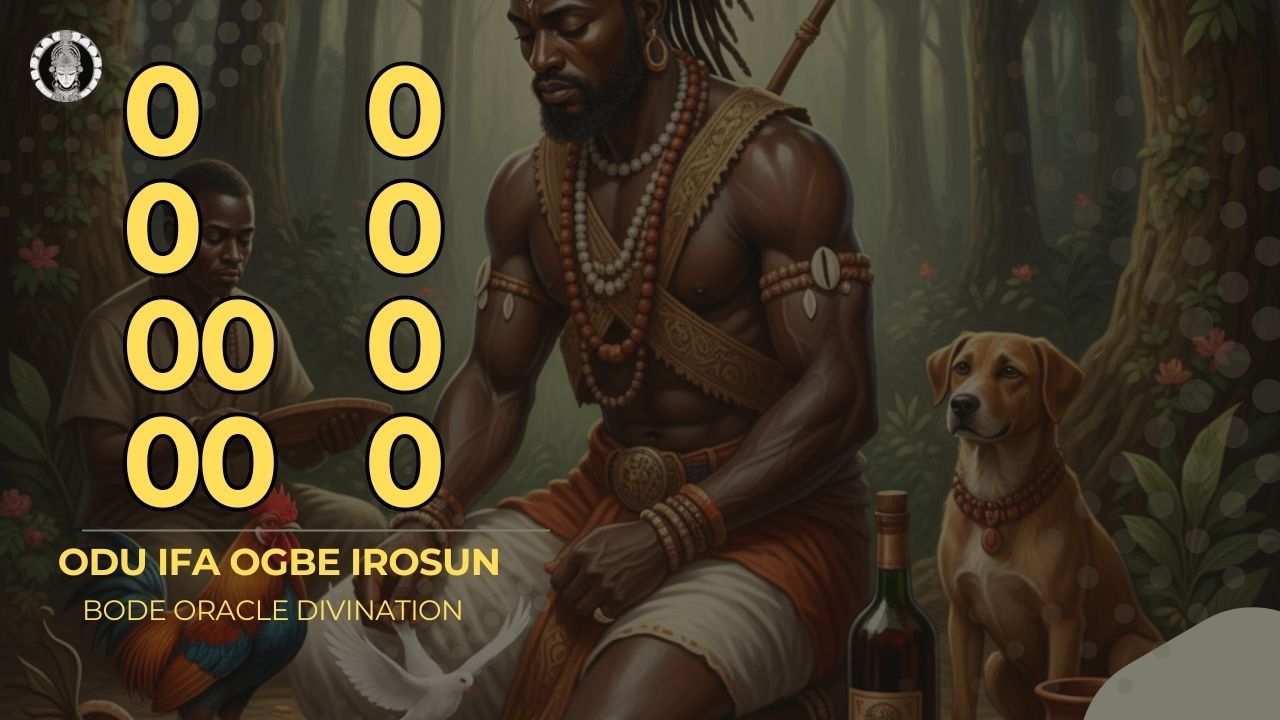
Ifa Divination for Ayinka: From Ingratitude to Honor
The Pain of Unrecognized Good Deeds
This divination from Ogbe Irosun addresses one of the most discouraging human experiences—consistently doing good for others yet receiving ingratitude, criticism, or even hostility in return. Ifa reveals that Aye (representing the world or society) was in a situation where every good deed resulted in negative response (ibi ni wón ma ńfi ṣu). This represents the universal frustration of unrewarded kindness and the spiritual exhaustion that comes from persistent ingratitude.
The divination teaches that this situation is not permanent and can be completely reversed through proper sacrifice. What makes this Odu particularly relevant today is how often people experience this exact situation—working hard, helping others, contributing to their communities, yet receiving no acknowledgment or even facing criticism for their efforts.
The Sacred Verse
Erín níí fi ibi mími s'ọlá
Ììrà ó ni jòbò tó ẹfòn
Ayinka awo ayé lo d'Ifá fún ayé
Wón ni k'áyé ó rú'bọ kí wón ón lè ma s'òrò rè ni rere
English Translation
The elephant makes its place of rest a place of honor
The ground will never tremble under the horn of a buffalo
Ayinka consulted an Oracle for Aye
They told Aye to offer a sacrifice so that he may be praised for his good deeds.
The Wisdom of the Elephant and Buffalo
The opening metaphors carry profound meaning about the nature of true worth and recognition. The elephant (erín) is so majestic that wherever it rests becomes a place of honor (ọlá). This teaches that true greatness transforms its environment simply by being present. Similarly, the buffalo's horn is so firmly grounded that the earth itself cannot shake it (ìrà ó ni jòbò tó ẹfòn).
These images represent the inherent value of good deeds, regardless of whether they receive immediate recognition. Like the elephant and buffalo, truly good works possess intrinsic worth that cannot be diminished by ingratitude. However, Ifa also teaches that this inherent worth should be recognized by others, and sacrifice can ensure that recognition manifests.
The Transformation of Public Perception
What makes this divination remarkable is the completeness of the transformation it brings. Before the sacrifice, every good deed Aye performed resulted in negative response. After the sacrifice was accepted, every person who had previously ignored or criticized Aye's good works began to appreciate and praise him (gbogbo ẹni ti ó bá wá ti ṣe oore fún ni ó wá ma yì ín).
This was not a matter of Aye changing his behavior—he had already been doing good. Rather, the sacrifice transformed how others perceived and responded to what he was already doing. This teaches that sometimes the blockage to recognition is not in our actions but in the spiritual realm, requiring spiritual intervention to open people's eyes and hearts.
The Song of Acknowledgment
After achieving this transformation, Aye sang a powerful song that contains important spiritual instruction. The song references the Ayin tree (àyìnká), which in Yoruba culture is known for its beneficial properties and is universally praised. The song says: "With the mouth that you're using to praise me, do not turn away" (Ẹnu tí ẹ mú yin mi, ẹ má má pádá).
This is both thanksgiving and spiritual declaration. It acknowledges the current praise while also spiritually securing continued recognition. The song demonstrates that once Ifa opens the way for honor and acknowledgment, that pathway should remain open through continued spiritual vigilance and gratitude.
Modern Application for Unrecognized Contributions
In contemporary society, this Odu speaks powerfully to professionals whose contributions go unacknowledged, parents whose sacrifices are taken for granted, community workers whose service receives no recognition, artists and creators whose work is used without credit, and anyone consistently giving more than they receive in acknowledgment. For scholarly perspectives on Ifa's role in knowledge systems, refer to research on algebraic characterization of Ifa divination codes.
The principle remains constant: when good deeds consistently meet with ingratitude, spiritual intervention through sacrifice can transform public perception and ensure proper recognition. This is not about ego or pride, but about the spiritual principle that good works should receive acknowledgment, as this acknowledgment encourages continued goodness in the world.
Prescribed Offerings (Ebo)
For those seeking recognition and proper acknowledgment of their good deeds, Ogbe Irosun prescribes a sacrifice of gratitude and honor (ẹbọ oriyin, ẹbọ àṣeyin). This offering specifically addresses the spiritual blockages that prevent others from seeing and acknowledging good works. The sacrifice should be performed with the guidance of a qualified Babalawo who can invoke the necessary spiritual forces to open the eyes and hearts of those who need to recognize the person's contributions.
Ifa Divination for Orunmila: Spiritual Protection Through Vigilance and Light
When Enemies Send Evil Forces
This divination from Ogbe Irosun presents a situation where even Orunmila himself, the grand priest of Ifa, faced spiritual attack from enemies who sent evil forces (ajogun ibi) against him. This teaches that no one, regardless of spiritual status or knowledge, is immune to spiritual warfare. The key is not avoiding such attacks but knowing how to respond when they come.
The fact that this divination features Orunmila demonstrates the universal nature of spiritual challenges. If even the master of Ifa faced such situations and needed to consult Babalawos and offer sacrifice, how much more should ordinary practitioners maintain constant spiritual vigilance? This story serves as both instruction and encouragement—spiritual attack is not a sign of spiritual failure but a reality that requires proper response.
The Sacred Verse
Àlùkínrínjin awo ilé Òrúnmìlà
Lọ d'Ifá fún Òrúnmìlà
Wọn ni kí Baba ó rú'bọ
Ki ibi ọ má ba à f'ẹsè wọ'lé e rè
English Translation
Alukinrinjin, the priest of Orunmila's house,
Cast Ifa for Orunmila.
They said the Father should offer a sacrifice
So that evil would not enter his home.
The Three-Night Battle
After Orunmila offered the prescribed sacrifice, the Babalawos performed a special Ifa ritual that provided him with a guiding light for victory (wọn ṣe Ifá fitílà ìṣégun). This spiritual lamp was not merely physical illumination but a manifestation of spiritual power that would guide Orunmila to victory over the evil forces sent against him.
For three consecutive nights, Orunmila maintained spiritual vigilance. Each night when he lit the lamp, he also struck the ground with his Orisha's sword (ó ńfi ádá Òrìṣà lu'lè). This combination of light and sound created a powerful spiritual deterrent. The evil forces (ajogun ibi) that had been sent to attack him saw the fire burning in his house and heard the sounds of his spiritual warfare.
On the first night, they came but were repelled by what they saw and heard. On the second night, the same occurred. By the third night, they stopped coming altogether (ìgbàtí ó dí ọjó kẹta, wọn ò wá mó). This demonstrates that consistent spiritual vigilance, combined with proper sacrifice, eventually causes evil forces to abandon their attack completely.
The Symbolism of Light and Sound
The spiritual lamp (fitílà) represents divine illumination that exposes and repels darkness. Evil forces operate in darkness and secrecy; when confronted with spiritual light, they cannot advance. The lamp also represents the constant presence of spiritual awareness—Orunmila did not light it once and forget about it, but maintained it night after night.
The striking of the ground with the Orisha's sword represents active spiritual warfare, not passive defense. The sound served as both warning and weapon, declaring spiritual authority and creating vibrations that disturbed the operations of evil forces. Together, light and sound created a complete spiritual defense system that protected Orunmila's home.
The Principle of Persistent Vigilance
This divination teaches that spiritual protection is not a one-time event but requires consistent vigilance. Orunmila did not assume that after the first night of lighting the lamp, his work was done. He maintained the practice for three nights, and this persistence ensured complete victory. The number three is significant in Yoruba spirituality, often representing completeness and the establishment of spiritual authority.
The lesson extends beyond the specific ritual: when facing spiritual attack, one must maintain spiritual practices consistently, not abandoning them after initial resistance. Many people offer sacrifice and then immediately drop their spiritual vigilance, allowing evil forces to return. Orunmila's example shows that protection requires ongoing spiritual awareness and practice.
Modern Application for Spiritual Protection
In contemporary times, this Odu speaks to anyone experiencing spiritual attacks, feeling targeted by enemies' negative intentions, sensing evil forces operating against their home or family, or facing persistent unexplained obstacles and difficulties. The principles of protection remain constant: proper sacrifice combined with consistent spiritual vigilance creates an impenetrable defense. For understanding the cultural significance of Ifa practice, explore UNESCO's documentation on Ifa of the Yoruba People.
The "lamp" in modern practice might take various forms—consistent prayer, spiritual readings, maintaining sacred spaces in the home, or regular consultation with spiritual guides. The "sword striking the ground" represents active spiritual engagement—not merely hoping for protection but actively claiming spiritual authority through prescribed practices.
Prescribed Offerings (Ebo)
For protection against evil forces and spiritual attacks, Ogbe Irosun prescribes specific sacrifices that establish spiritual authority around one's home and person. The ritual often includes the creation of a spiritual light or beacon that serves as ongoing protection. All such work should be performed under the guidance of a qualified Babalawo who can properly invoke the necessary spiritual forces and establish the protective mechanisms that ensure lasting security.
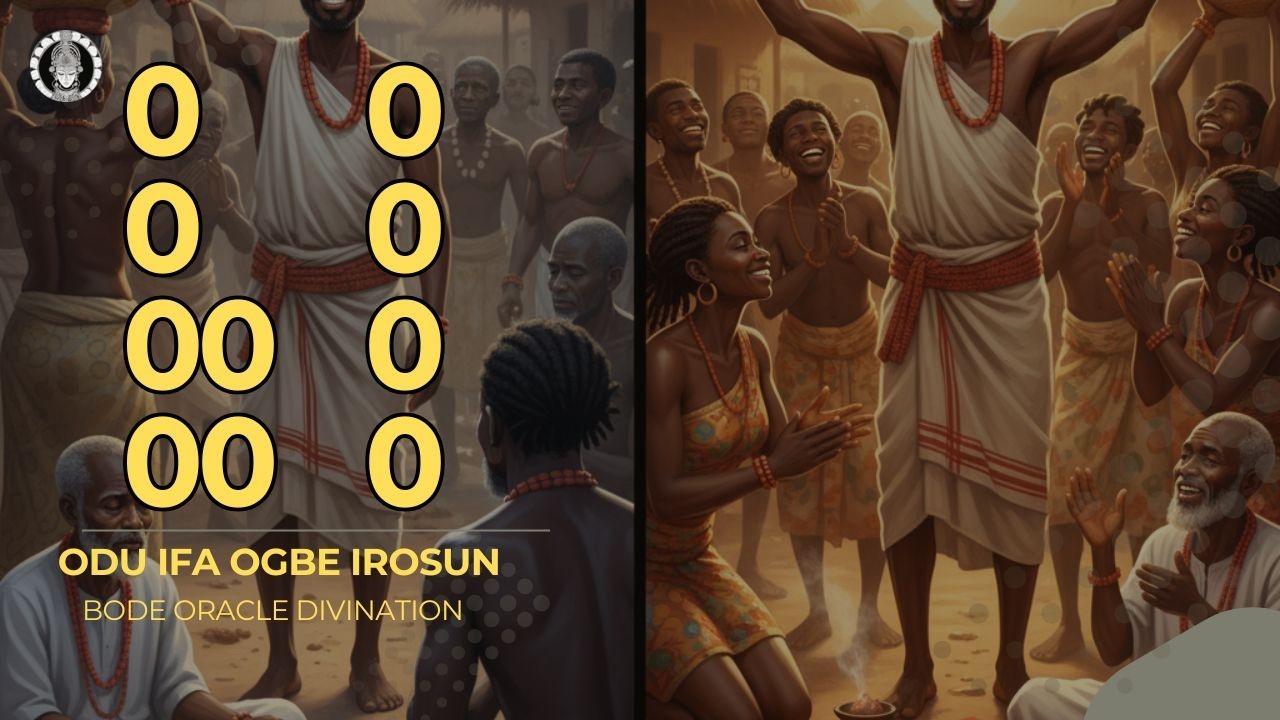
Additional Resources
Internal Links
- Complete Guide to Ogbe Irosun - Detailed information, taboos, and practices
- Ogbe Irosun Blog Post
- Bode.ng Blog - Extensive collection of Ifa and Yoruba spirituality articles
- Complete Odu Ifa Directory
- All About the 16 Odu Ifa and Their Meaning
External Resources
- African Traditional Religions: Ifa Divination - Duquesne University
- Ifa of the Yoruba People of Nigeria - UNESCO
- Algebraic Characterization of Ifa Main Divination Codes
- UNESCO Recognition of Ifa Divination System
- Ifa Divination System - Wikipedia
- Opon Ifa (Divination Tray) - Wikipedia
Connect With Us on Social Media
- BODE Oracle on TikTok
- BODE Oracle on YouTube
- BODE Oracle on Facebook
- BODE Oracle on X (Twitter)
- BODE Oracle on Pinterest
Visit Bode.ng to explore more divination teachings, participate in quizzes and polls, and connect with our community of practitioners and learners. Register today to access exclusive content and personalized guidance on your spiritual journey.
Frequently Asked Questions And Answers About Odu Ifa Ogbe Irosun (Ogbe Mosun)
Find answers to common questions about this sacred Odu Ifa and its divination teachings
Ogbe Irosun, also called Ogbe Mosun or Ogbe Rorun, is one of the 256 sacred Odu in the Ifa corpus. It carries powerful messages about fertility and childbearing, victory over enemies through spiritual sacrifice, receiving recognition for good deeds, and protection against evil forces. This Odu teaches that through proper sacrifice and spiritual compliance, one can overcome infertility, defeat adversaries, gain honor, and maintain spiritual protection.
The divination of Osungaga in Ogbe Irosun specifically addresses infertility challenges. When a woman receives this Odu and is struggling to conceive, Ifa prescribes sacrifice to enable her to bear many children. The story of Osungaga demonstrates that even after prolonged infertility, proper sacrifice transforms the situation completely, leading to multiple children and great joy. The emphasis is on sincere offerings rather than elaborate expense.
The divination of Eleriwo and Eleda teaches that Ogbe Irosun provides victory over enemies, even when they possess powerful medicine or harmful intentions. Through proper sacrifice, the negative forces sent by enemies are reversed back upon them. Eleriwo, a powerful herbalist who attacked Eleda, was ultimately destroyed by his own medicine because Eleda had offered the prescribed sacrifice. The Odu emphasizes that spiritual protection through sacrifice is more powerful than any earthly medicine or harmful magic.
The divination for Aye (the world) addresses the frustration of doing good deeds without receiving acknowledgment. Ogbe Irosun reveals that when someone consistently helps others but receives ingratitude, they should offer a sacrifice of gratitude and honor. This sacrifice transforms public perception, ensuring that good deeds receive proper recognition and praise. The story teaches that sometimes the blockage to recognition is spiritual rather than behavioral, requiring spiritual intervention to open people's eyes and hearts.
Orunmila received Ogbe Irosun when enemies were sending evil forces against him. He offered the prescribed sacrifice and lit a spiritual lamp that guided him to victory. For three consecutive nights, he struck the ground with his Orisha's sword while the lamp burned. The evil forces saw the light and heard the sounds, eventually retreating completely. This demonstrates the protective power of proper sacrifice combined with consistent spiritual vigilance.
The phrase "mo rú wéré, mo tú wéré" (I made a small offering, I performed a small ritual) emphasizes that the effectiveness of sacrifice depends on sincerity and compliance rather than size or expense. Osungaga's offering was described as "small" (wéré), yet it produced extraordinary results—transforming barrenness into abundant fertility. This teaches that Ifa does not require elaborate or expensive sacrifices to work miracles. What matters is the heart's sincerity and willingness to follow spiritual instruction.
The metaphor "àdó ńlá a bidi kotopo" (the large gourd with a small, firm bottom) describes something that appears impressive but lacks true stability. This represented Eleriwo's position—his medicine seemed powerful and formidable, but it rested on an unstable spiritual foundation because it was used for harmful purposes. In contrast, Eleda's position, though appearing weaker, rested on the solid foundation of proper sacrifice. The metaphor teaches that true power comes not from earthly capabilities but from spiritual alignment with divine forces.
The three-night practice demonstrates that spiritual protection requires consistent vigilance, not one-time effort. Orunmila maintained his spiritual practices for three consecutive nights, and this persistence ensured complete victory. The number three is significant in Yoruba spirituality, often representing completeness and the establishment of spiritual authority. This teaches that when facing spiritual attack, one must maintain spiritual practices consistently rather than abandoning them after initial resistance.
The verse states "The elephant makes its place of rest a place of honor" and "The ground will never tremble under the horn of a buffalo." These metaphors represent the inherent value of good deeds, regardless of whether they receive immediate recognition. Like the elephant whose presence transforms any place into one of honor, truly good works possess intrinsic worth that cannot be diminished by ingratitude. The buffalo's unshakeable horn represents the firm foundation of righteousness. However, Ifa also teaches that this inherent worth should be recognized by others, and sacrifice can ensure that recognition manifests.
All sacrifices (ebo) in Ogbe Irosun should be performed under the guidance of a qualified Babalawo or Iyanifa. The priest ensures proper procedures, invokes necessary incantations, and adapts traditional practices to modern contexts when needed. The spiritual power comes not just from the physical materials but from the prayers, invocations, and spiritual knowledge that accompany preparation and offering. Different divinations within Ogbe Irosun require different offerings tailored to specific situations—fertility, protection, victory, or recognition.
Yes. While the divination of Osungaga specifically addresses physical childbearing, the principles of Ogbe Irosun apply to any situation where one desires to "birth" new projects, ideas, businesses, or creative works that seem unable to manifest. When conception of any kind seems impossible despite repeated efforts, spiritual intervention through proper sacrifice can open closed wombs—whether literal or metaphorical—and bring forth abundant life. The Odu addresses both physical fertility and the broader concept of bringing new things into existence.
You can explore comprehensive information about Ogbe Irosun through several resources:
- Complete Guide to Ogbe Irosun - Detailed taboos and practices
- Ogbe Irosun Blog Post
- Bode.ng Blog - Extensive articles on Ifa spirituality
- Complete Odu Ifa Directory
- Bode.ng - Access divination services and community resources
Connect with us on social media for regular teachings: TikTok, YouTube, Facebook, X (Twitter), and Pinterest @BODEOracle.
